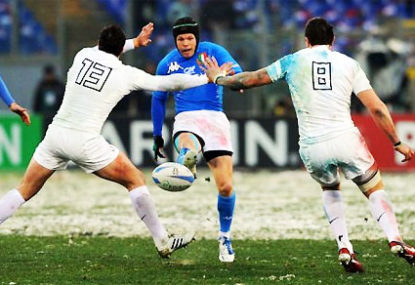Pom's hilarious reaction as former teammate turned ref spares him from 'stonewall' second yellow
After being yellow-carded by referee Karl Dickson in the first half, the official looked to be reaching for his pocket when Danny Care contentiously…

On the final day of the Six Nations, England, Ireland and Wales started with the same number of points. It wasn’t enough to win their final games: the winning margin mattered.
England had their noses just in front but faced the toughest opponents in France. Ireland faced Scotland, and Wales faced Italy. The games would be played in reverse order to the points differential.
It led to an incredible trifecta of rugby that played out like a creative lesson on kinetic energy.
It didn’t start out that way. Wales only led by one point at halftime. The loss of their ever-reliable points machine, Leigh Halfpenny, seeing the more attack-minded and defensively frailer Scott Williams come on may well have caused Wales to chance their arm.
Whatever was said at halftime worked, Wales scoring seven second-half tries, including a hat-trick to George North. Suddenly the pressure was on Ireland, who needed to win against Scotland by 20. Ireland duly responded, and after a sluggish start – they only led 20-10 at half-time – they pulled away and defeated Scotland by 30 points.
That meant England at home needed to win against France by 26 points, which looked beyond England when after the first quarter they trailed 15-7.
On a day when the Canterbury Crusaders came down from 14-10 to put on 47 unanswered points, England nearly pulled off something similar.
England racked up their largest ever score against France, eventually winning 55-35. Whichever brand supplied drinks at half-time to these teams seriously needs to cash in.
Ireland ran out eventual Six Nations winners by a mere six points, with Wales only three points behind second-placed England. But if these matches were played without the overall context behind them, would the games have had different results?
Of course, we have witnessed something similar in the Southern Hemisphere.
In 2012, South Africa went into their final game of the inaugural Rugby Championship with only a bonus-point try good enough to take the title. The Springboks scored four tries and got their bonus point but it wasn’t enough to take the overall title.
The All Blacks felt under siege after people wrote off their Eden Park win due to the poor officiating by referee Romain Poite in terms of his first yellow card to Bismarck du Plessis. However, the following year saw all pressure taken away from the Springboks in that the Rugby Championship had already been decided. They literally had nothing to lose as it had already been won by another team.
The difference between winning and losing can often be minimal, but New Zealand’s best World Cup displays – the inaugural tournament and the 1995 and 2011 semi-finals – were when the All Blacks’ ability to win was called into question.
The fear of losing can be as psychologically damaging as the thought of having nothing to lose can be liberating. For example, England went into their final match against Wales in the very last Five Nations with a Grand Slam in their sights and ended up coming away with not only a loss but losing the Six Nations crown to Scotland.
This is by no means a universal rule, but it does seem when the pressure goes off in terms of public expectation to win, teams can put in special performances.
An obsessive hunger to win can prove debilitating. Up until Wales’ scratchy win against South Africa last autumn, they couldn’t get a win against a Southern Hemisphere team, and it wasn’t for lack of trying. Heyneke Meyer was also probably wondering until last year whether he was ever going to be brought a beer by his New Zealand counterpart, Steve Hansen.
When that monkey climbs onto your back and makes his home there, it’s hard to shake the little nuisance off.
A coach has to justify his job by results. This may well explain a reluctance for coaches to go all out on attack and tend towards the conservative.
Stuart Lancaster, for example, has yet to taste Six Nations success. The only saving grace is his consistency. Days like Saturday, however, must gnaw at the back of his mind. Why can his team play without inhibitions in the second half, but look so fragile the previous year against the same opponent when it mattered? The Six Nations title wasn’t at stake at that stage of the tournament but it was definitely touted as a crunch match.
Saturday was a case of not dying wondering. So why can’t teams always approach games with that attitude?